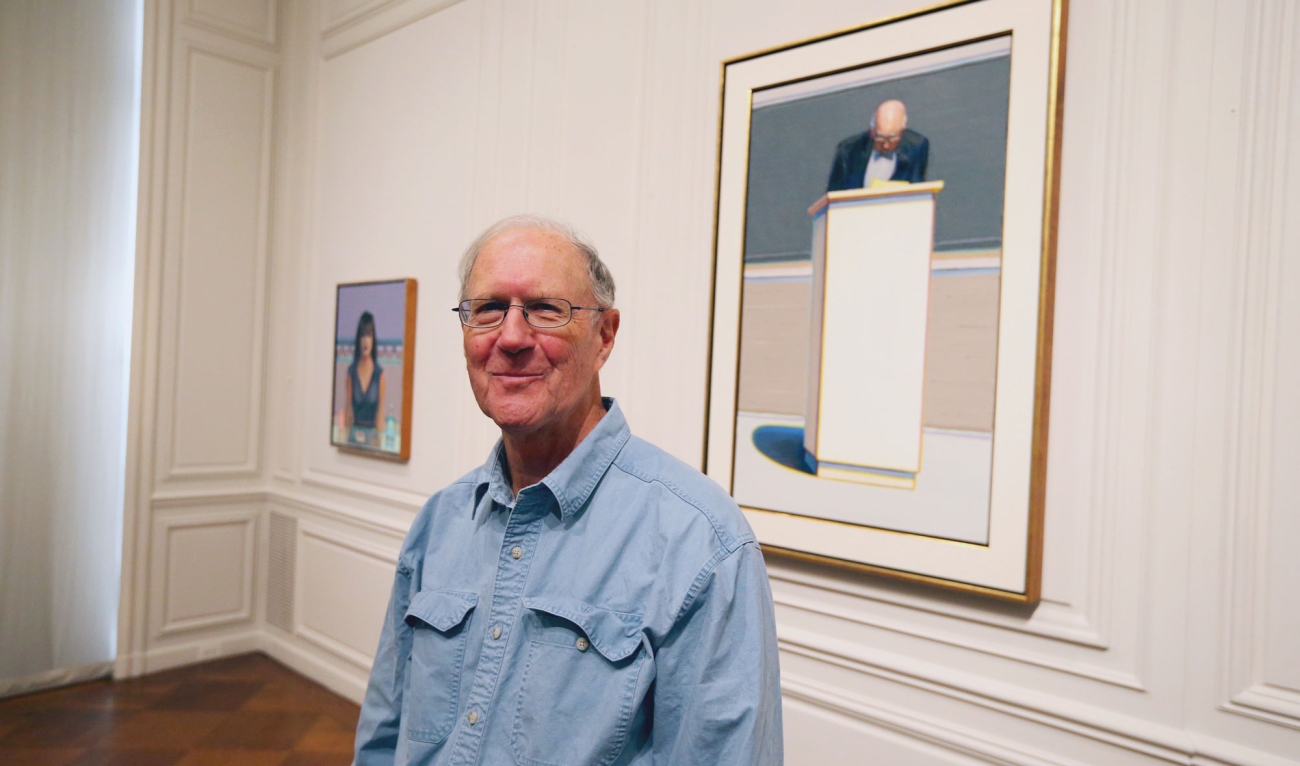The Voyager
If we are lucky in life, we come across a teacher who changes our life. Someone who is so knowledgeable, passionate, and inspiring about a subject that their teaching penetrates any reluctance to learn, and in the process we become not only better students but suddenly eyes-wide to the possibility of learning more from other teachers—and more curious about all things encountered in life. Because of that one teacher.
John Wilmerding, who died in June at 86, was that teacher for me. His specialty was 19th-century American art. He taught at Dartmouth and Princeton, and he was deputy director of the National Gallery for a time. He wrote dozens of books about art and artists, including biographies of Robert Salmon, Fitz Hugh Lane, Thomas Eakins, Andrew Wyeth, and Richard Estes, to name but a few. I met him in his survey class on American art my freshman year.
Another student of Wilmerding’s was my classmate and lifelong friend James Nachtwey ’70, who went on to major in art history, a springboard into his career as a visualist of another kind—as a celebrated war photographer. We often discussed how Wilmerding taught us how to look at a work, painting, sculpture, or photograph and learn how to break down the compositional elements to better describe its success or lack of success. On a winter’s eve, James and I left a bottle of champagne on the stoop of Wilmerding’s Hanover home to celebrate our teacher’s 30th birthday.
After Dartmouth, my friendship with Wilmerding only deepened. He owned a summer home in Northeast Harbor, Maine, on Somes Sound, the only fjord on the East Coast of North America. We visited him in all seasons, sailing, hiking, organizing dinner parties with intriguing characters and memorable conversations. One famous and rowdy dinner party led me to write a three-hander play about the evening called What Are Friends For. Maybe it’s time to see it staged.
I'll never forget one New Year’s Eve in the early 1970s, when I visited Wilmerding in Maine and there was a “black freeze” on Long Pond. For skaters, this rare ice quality appears only after an extended period of frigid temperatures and no precipitation. We spent an afternoon skating to the windward end of the pond, then holding a blanket like a spinnaker between us and letting the strong wind hurtle us downwind over the mirror-like ice, whooping and laughing for a mile or more as we gathered speed, leg muscles screaming.
Later we treated ourselves to a champagne and lobster dinner (two lobsters each, purchased from a local man named Chester for $5 total). I opened my window a crack that frigid night and the air poured over the sill like a liquid glacier. Legs sore, belly bending, smile maybe visible even in the dark, I was asleep in minutes.
At the end of that first freshman-year class, Wilmerding put up two paintings on the classroom screen: one by Salmon, one by Lane. He tapped one of the images and asked the class to identify the artist. My arm shot up.
When I shouted out the wrong artist, his dismay was visible. “What’s your name?” he asked, disappointment in his voice. “Smith, sir,” I responded. He tried his best not to laugh. Our friendship was launched.
Thomas Cole’s The Voyage of Life, a four-panel American masterpiece that celebrates childhood, youth, manhood, and old age, hangs in Wilmerding’s old place of employment in Washington, D.C. It is a painting we often discussed.
It makes me happy to know that in my life I shared three of those panels with John. Now he’s put the last panel behind him. What a teacher. What a mentor. What a friend.
Denis O’Neill is a screenwriter and author. He lives in Beverly Hills, California.











